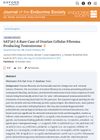 1 citations,
July 2011 in “Climacteric”
1 citations,
July 2011 in “Climacteric” Long-term estrogen therapy in postmenopausal women can improve certain health markers, hair loss is common regardless of hormone use, stopping estrogen doesn't increase breast cancer risk, smoking does, and a balanced BMI is linked to lower mortality.
 1 citations,
November 2008 in “Gerontology”
1 citations,
November 2008 in “Gerontology” Older adults use lifestyle drugs to improve life quality and appearance, but caution is needed due to side effects and potential abuse.
 August 2019 in “Journal of archaeological science: Reports/Journal of archaeological science: reports”
August 2019 in “Journal of archaeological science: Reports/Journal of archaeological science: reports” Ancient hair can preserve hormones, revealing health and fertility insights.

The document concludes that diagnosing female hair loss requires careful examination, with treatments varying by condition and psychological support often necessary.
 August 2015 in “Dermatología Argentina”
August 2015 in “Dermatología Argentina” Frontal fibrosing alopecia causes hairline recession and eyebrow loss in postmenopausal women.
 44 citations,
October 2011 in “Gynecological Endocrinology”
44 citations,
October 2011 in “Gynecological Endocrinology” Menopause significantly reduces skin collagen, leading to thinner, less elastic skin, and hormone replacement may help but requires careful consideration.
 4 citations,
May 2007 in “Oral and Maxillofacial Surgery Clinics of North America”
4 citations,
May 2007 in “Oral and Maxillofacial Surgery Clinics of North America” Understanding gender differences and individual patient characteristics is essential for optimal cosmetic surgery outcomes.
 August 2012 in “Pharmaceutical Medicine”
August 2012 in “Pharmaceutical Medicine” The document concludes that various medications and treatments can have significant, sometimes adverse, effects on health outcomes.

Preparing and learning about menopause can improve women's quality of life as they approach this phase.
 October 2023 in “Journal of the Endocrine Society”
October 2023 in “Journal of the Endocrine Society” A woman's ovarian fibroma caused high testosterone levels, which normalized after surgery.
62 citations,
October 2019 in “Liver International” Women with PCOS have more severe liver disease.
 21 citations,
October 2017 in “Journal of the European Academy of Dermatology and Venereology”
21 citations,
October 2017 in “Journal of the European Academy of Dermatology and Venereology” Various potential triggers may be causing the rise in frontal fibrosing alopecia, and avoiding these could help stop the disease's increase.
3 citations,
April 2020 in “Medicine” Acupuncture may be a safe and cost-effective treatment for Seborrheic alopecia.
 October 2024 in “Journal of the Endocrine Society”
October 2024 in “Journal of the Endocrine Society” The case highlights the complexity of diagnosing high testosterone in older women and the need for thorough testing.
 January 2022 in “IntechOpen eBooks”
January 2022 in “IntechOpen eBooks” Some lesser-known causes of PCOS include autoimmune issues, genetic mutations, and changes in the body's microbiome.
2 citations,
July 2021 in “The journal of investigative dermatology/Journal of investigative dermatology” Sex hormones likely don't affect atopic dermatitis in adolescents and adults.

Thyroid problems can cause hair loss and change hair texture.
April 2019 in “Journal of Investigative Dermatology” Frontal Fibrosing Alopecia involves disrupted cholesterol pathways, fibrosis, and increased mast cells.
 4 citations,
April 2021 in “Frontiers in Immunology”
4 citations,
April 2021 in “Frontiers in Immunology” Different types of RNAs are found in varying amounts in patients with Polycystic Ovary Syndrome, suggesting they could be important in the disease's development and potentially used as disease markers.
 April 2023 in “Bulletin of the National Research Centre”
April 2023 in “Bulletin of the National Research Centre” The document concludes that more research is needed to understand how PRP affects the ovaries and to standardize its use in treatment.
 April 2023 in “Journal of Investigative Dermatology”
April 2023 in “Journal of Investigative Dermatology” Being allergic to linalool, a common fragrance ingredient, might contribute to developing frontal fibrosing alopecia.
 April 2020 in “Journal of the Endocrine Society”
April 2020 in “Journal of the Endocrine Society” An ovarian tumor caused a woman's male-like symptoms, which improved after surgery.
 September 2013 in “Hair transplant forum international”
September 2013 in “Hair transplant forum international” The document says doctors should identify and treat Frontal fibrosing alopecia medically before considering surgery, as treatments often don't work well.
 16 citations,
April 2018 in “Current opinion in gynecology and obstetrics”
16 citations,
April 2018 in “Current opinion in gynecology and obstetrics” Hispanic women with PCOS are more likely to have liver diseases like NAFLD and NASH.
 14 citations,
March 2022 in “Clinical Endocrinology”
14 citations,
March 2022 in “Clinical Endocrinology” The document concludes that a systematic approach is crucial to identify causes of androgen excess in women beyond the most common cause, Polycystic ovary syndrome (PCOS).
 14 citations,
January 2008 in “Dermatology Online Journal”
14 citations,
January 2008 in “Dermatology Online Journal” Hormonal therapies like cyproterone acetate and spironolactone may help some women with hair loss, but finasteride 1mg is not useful, and the effectiveness of other treatments is still unclear.
7 citations,
January 2019 in “Journal of clinical medicine research” Menopause causes significant changes in the vaginal introitus, but less so in the labia majora, which may lead to symptoms of vaginal atrophy.
1 citations,
February 2024 in “Pharmaceutics” Nanovesicles improve drug delivery through the skin, offering better treatment outcomes and fewer side effects.
 1 citations,
December 2022 in “Gynecological Endocrinology”
1 citations,
December 2022 in “Gynecological Endocrinology” The most common skin issues in females with Polycystic Ovary Syndrome (PCOS) are excessive hair growth, hair loss, oily skin, acne, dark skin patches, and skin tags, which may be linked to hormone and insulin levels.
 August 2024 in “Drug Design Development and Therapy”
August 2024 in “Drug Design Development and Therapy” Decursin shows promise for treating cancer, neuroprotection, inflammation, and hair loss.























